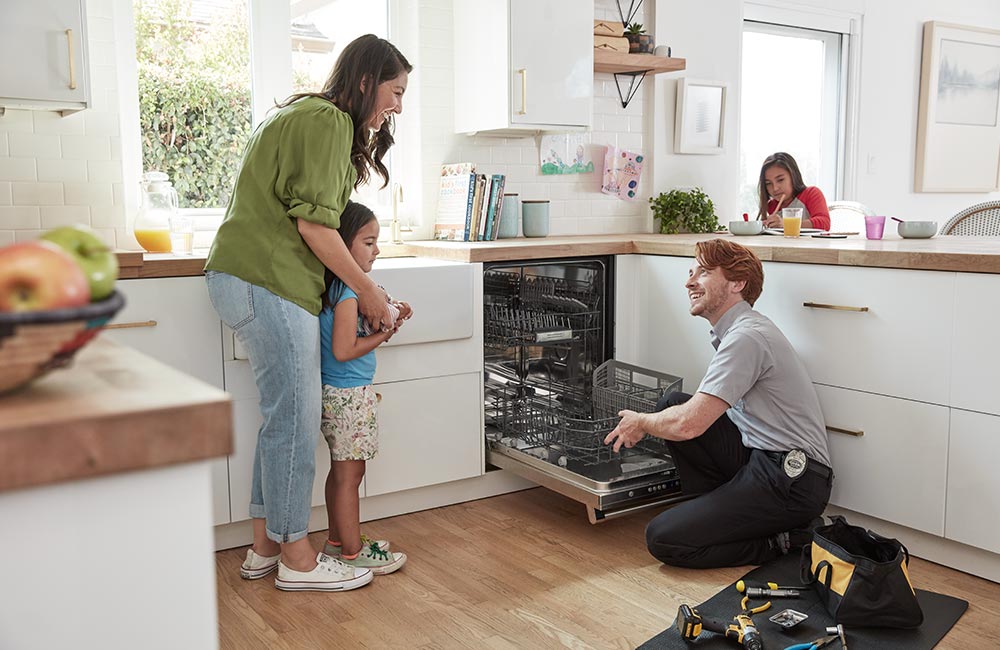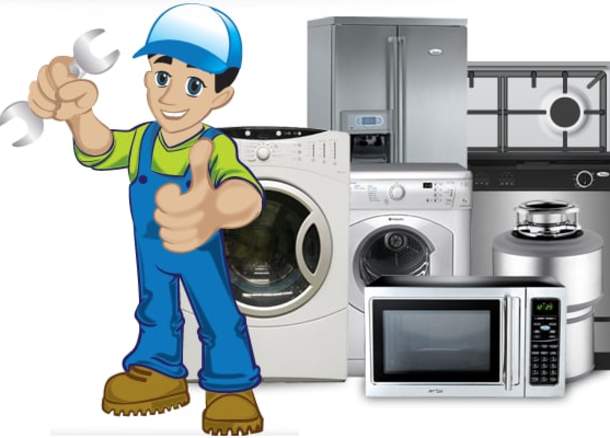The Ultimate Overview to Understanding Device Repair at Home
When your refrigerator stops cooling down or your oven refuses to heat, it can feel overwhelming. Comprehending appliance repair in the house can save you money and time. You'll find out to identify signs and symptoms, utilize crucial devices, and follow a systematic troubleshooting procedure. Yet prior to you begin, there are vital safety preventative measures you require to take into consideration. What are one of the most common issues, and exactly how can you repair them? Let's explore the basics.
Common Home Appliance Issues and Their Signs
When your devices begin acting up, it's necessary to recognize the indicators at an early stage. Disregarding them can result in bigger concerns and expensive repairs. For example, if your fridge isn't cooling appropriately, you may discover warm places or condensation developing. This can show a falling short compressor or a blocked vent.Your dishwashing machine might show problems with unclean meals or unusual noises throughout cycles. If you hear grinding or clanking, it's time to investigate.A washing equipment that will not spin or drain pipes can leave you with soggy laundry, recommending a clogged up drain or a malfunctioning pump.Lastly, if your oven's temperature level seems off or it takes for life to preheat, you may be dealing with a malfunctioning thermostat. By staying sharp to these signs and symptoms, you can attend to problems before they escalate into significant fixings.
Crucial Tools for Device Repair Service
When you're dealing with appliance repair work in your home, having the right devices is crucial. Basic hand devices like screwdrivers and pliers will assist you disassemble and fix various home appliances, while electric screening gadgets ensure you're working securely with electrical wiring. Allow's review what you require to start on your fixing journey.
Standard Hand Devices
Having the right tools is vital for reliable appliance fixing in the house. Beginning with a dependable screwdriver set, consisting of both flathead and Phillips kinds, as screws are usual in device setting up. Pliers are likewise essential; they aid with gripping, turning, and cutting wires or small parts. A pair of needle-nose pliers can reach limited places conveniently. You'll need a great flexible wrench for tightening up or loosening up nuts and bolts. An energy knife comes in handy for puncturing packaging or insulation. Don't forget a sturdy workbench or surface area to securely organize your devices and parts. With these fundamental hand tools, you'll be well-prepared to deal with most home appliance repairs that come your method.
Electrical Screening Gadgets
Together with basic hand tools, electrical screening tools play an important function in appliance repair service. These devices help you detect electric concerns and guarantee home appliances operate securely. A multimeter is essential; it measures voltage, present, and resistance, enabling you to identify problems swiftly. A non-contact voltage tester is an additional must-have, allowing you identify real-time cords without making direct call, improving your safety. Clamp meters are terrific for determining current circulation in cables without disconnecting them, conserving you time and effort. In addition, circuit testers can swiftly check if electrical outlets are operating appropriately. By utilizing these devices, you'll enhance your troubleshooting procedure and improve your repair service skills, making appliance maintenance a lot easier.
Step-by-Step Overview to Diagnosing Device Issues
When your device acts up, it can be irritating, yet diagnosing the concern does not need to be frustrating. You'll learn to recognize usual issues and use reliable repairing methods. Allow's go through the actions to obtain your appliance back in working order.
Usual Appliance Troubles

Troubleshooting Techniques Explained

Repairing Major Kitchen Home Appliances: A Closer Look
Have you ever before asked yourself exactly how to take on common issues with your cooking area home appliances? Repairing significant cooking area appliances like refrigerators, stoves, and dishwashers can be simpler than you think. Beginning by recognizing the trouble-- whether it's a fridge not cooling down or a stove that will not heat up. Frequently, an easy reset or inspecting the power source can resolve the issue.For fridges, clean the condenser coils and check the door seals. If your stove's not heating, check the heating component and thermostat. Dish washers might just require a clean filter or a reset to get them back at work. Always unplug the appliance prior to diving right into fixings to ensure your safety.Don' t forget to consult the customer handbook for certain troubleshooting suggestions associated with your model. With a little bit of persistence and the right devices, you can confidently take on home appliance repairs and conserve cash while doing so!

Repairing Laundry Equipments: Tips and Techniques
When your washing appliances begin acting up, it can really feel overwhelming, yet fixing them doesn't have to be a hassle. Start by examining the power supply. Validate the device is connected in and the outlet is operating. Next, evaluate the door or lid switch; a defective button can protect against the equipment from operating.For washing machines, if it's not rotating, look for unbalanced loads. Redistributing the clothing may fix the issue. If your clothes dryer isn't home heating, clean the lint filter and inspect the air vent for blockages.Listen for unusual sounds; they can show a trouble. If your appliance is dripping, examine the hose pipes for cracks or loosened connections. Document any error codes displayed on digital screens, as they can direct you in identifying the problem. Lastly, seek advice from the individual guidebook for particular repairing ideas connected to your model.
Safety And Security Preventative Measures to Take Throughout Services
Prior to you begin any kind of appliance repairs, it's important to prioritize safety and security to stop mishaps or injuries. Disconnect the device or transform off the circuit breaker to guarantee no power reaches it while you function. Use protected devices to lessen the threat of electrical shock. Use security goggles and gloves to protect yourself from sharp edges or debris (Kenmore Dryer Repair Oro Valley Dependable Refrigeration & Appliance Repair Service).Make certain your work area is clean and well-lit, so you can see what you're doing. Maintain children and pet dogs away from the area to avoid diversions and potential risks. If you're handling gas home appliances, be extra cautious; look for leakages prior to proceeding.Take your time, and do not rush with fixings. If you really feel unpredictable about any action, it's far better to pause and study than to presume. Following these safety measures will assist develop a safer setting for your DIY appliance fixing task
When to Call an Expert for Help
Exactly how do you get more info recognize if it's time to call an expert for appliance repair services? If you have actually attempted fundamental troubleshooting without success, it's a clear indicator. If your home appliance still won't start or shows unusual sounds after resetting it, do not think twice to seek expert help.When you notice leaks, smoke, or melting smells, focus on security and call a professional right away. These issues can lead to even more considerable damage or position dangers to your home.Also, if your home appliance is under guarantee, getting in touch with a specialist is often the most effective course. They can assure that repairs won't nullify your guarantee, saving you money in the lengthy run.Finally, if you're unsure or awkward with complicated repair services, it's smart to leave it to the experts. Bear in mind, tackling difficult concerns without the appropriate proficiency can lead to costly blunders. Count on an expert when unsure!
Regularly Asked Questions
Just How Can I Protect Against Device Troubles in the Future?
To stop device problems in the future, you should carry out normal upkeep, check for deterioration, clean filters, and avoid overloading. Remaining positive will help prolong their lifespan and keep them running smoothly.
What Are the Many Usual DIY Home Appliance Fixing Mistakes?
You may forget safety and security precautions, miss troubleshooting steps, or use wrong tools when trying DIY device fixings. Hurrying the procedure or overlooking manufacturer standards can lead to even more significant problems and expensive blunders. Keep individual and notified!
Exactly how Do I Know if a Component Needs Replacement?
You can inform if a component needs substitute by looking for uncommon sounds, leakages, or irregular efficiency. If the appliance battles to run appropriately or shows noticeable damage, it's likely time for a replacement.
Can I Make Use Of Generic Parts for Device Repair Works?
Yes, you can use common parts for appliance repair work, but ascertain they work - Dependable Refrigeration & Appliance Repair Service Washer repair near me. Common components may save you cash, yet they can impact efficiency or longevity, so consider your options very carefully prior to deciding
What Guarantees Cover Appliance Fixes?
Most home appliance guarantees cover fixings for producing problems, however they usually omit damages from abuse. Inspect your guarantee terms very carefully, as some may call for utilizing licensed technicians and original parts for coverage to remain legitimate.